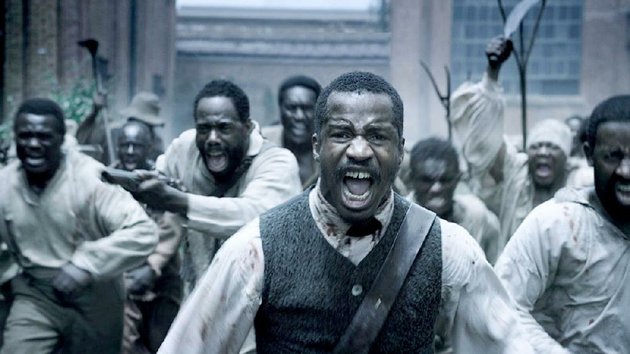By Mark Saldana
Rating: 3.5 (Out of 4 Stars)
In 1915, one of the most controversial movies ever made was released in theaters. D.W. Griffith’s The Birth of a Nation, a silent propaganda film, preyed on the racial fears prevalent at the time, and presents the Ku Klux Klan as a heroic organization whose intentions are to serve and protect white people against the “threats” of black people. The 2016 movie with the same title does not remake or re-imagine Griffith’s film, but presents a different story of racism and the atrocities that took place during the era of slavery. Nate Parker wrote, directed, and stars in this powerful movie that tells the tragic story of Nat Turner and his short-lived slave rebellion that took place in 1831.
Turner (Nate Parker) stands out from the rest of the slaves at a young age. As a child he learns to read and write and dedicates much of his time to the study of the Bible. As an adult, he becomes a preacher for the slave community in Southampton County, Virginia. When his master Samuel Turner (Armie Hammer) begins to suffer from financial hardships, he is persuaded by other plantation owners to take Nat on the road and travel to their properties so that he can preach to them. Though this may sound rather thoughtful of the masters, their ulterior motive is for Nat to preach mesages of obedience and submission, despite their cruel and abusive treatment. As Nat sees more and more atrocious treatment of slaves, and he and his wife (Aja Naomi King) experience some horrible abuses as well, he decides to organize a group of slaves in the community to fight for their freedom.
Though not as exceptionally written or directed as 12 Years a Slave, The Birth of a Nation is still a well written and directed film, which says quite a bit considering that this is Nate Parker’s first feature film as a writer/director. If anything, Parker’s movie tells a story more relevant to the racial tensions that currently exist in the United States, particularly the tension and violence that often occurs between officers of the law and African-Americans. Parker’s film presents the story of a good man pushed to the breaking point where he refuses to accept the violence and abuse imposed upon him and his people. Parker develops his protagonist well, and builds up empathy for him and the slaves beautifully. One cannot help, but feel sympathy for them and anger for the horrendous treatment they receive. The film is a heartbreaking and powerful experience as it should be.
Considering that Parker serves as not only the screenwriter and director, but also the star shows that he is a multifaceted talent. In addition to proving himself as a worthy filmmaker, Parker delivers a wonderful and powerful performance, beautifully expressing all the appropriate emotions of Nat Turner. Aja Naomi King also offers an outstanding turn as Nat’s wife Cherry. Armie Hammer is solid as Nat’s master Samuel, but some of the other white actors portraying Southern people laid on the accents rather thickly. There are some fine performances (Jackie Earle Haley, Mark Boone Junior), but there are others that feel a bit forced and caricaturesque.
Still, despite the flaws that this movie has, it is a very important film at a crucial time in our nation when I feel people need to reflect on the state of race relations. D.W. Griffith’s The Birth of a Nation was released one hundred and one years ago. during a time racial disharmony. The U.S. may have come a long way since then, but the fact that a modern filmmaker would decide to reclaim that title to not only tell a story during a dark chapter in U.S. history, but also to compare it to recent events indicates that we are still have a ways to go.
